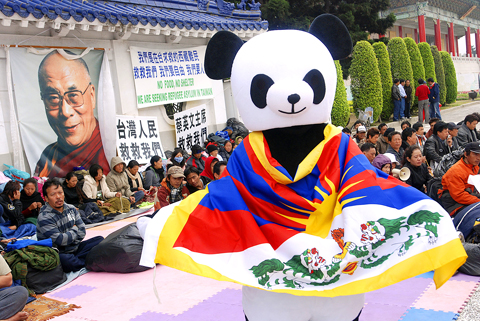Tibet supporters and human rights groups yesterday urged the government to amend the Immigration Act (出入國及移民法) and pass an asylum bill to grant legal status to Tibetans and other international refugees.
“The government said that it will issue temporary residency to the Tibetans [in the group on Liberty Square in Taipei], but it’s not the final solution to their problems as temporary residency does not allow them to work,” Taiwan Friends of Tibet vice-chairman Yang Chang-chen (楊長鎮) told a press conference at Liberty Square.
More than 100 Tibetans living in Taiwan without legal status have been staging a sit-in demonstration on the square since Sept. 9, pleading with the government to grant them asylum.

PHOTO: CHIANG YING-YING, AP
Many of them had made the dangerous crossing through the Himalayas into Nepal before coming to Taiwan on forged Nepalese or Indian passports.
After a meeting with Tibetan and human rights activists on Monday, the government said it would likely issue temporary residency permits to the Tibetans and help them find shelter so that they could at least live in the country legally.
The activists, however, don’t think the government has gone far enough.
“The Tibetan pandas enjoyed a high-profile warm welcome, while the Tibetan refugees were left aside — this is not good for Taiwan’s international image,” Yang said.
China’s Wolong National Nature Reserve, the major habitat for pandas, is in a part of Sichuan Province that was traditionally a Tibetan domain and was part of an independent Tibet before the Chinese invasion in 1959.
After the activists performed a short play to reenact segments of Tibetan history, some of the Tibetan protesters presented khatas — a traditional Tibetan scarf used to show welcome or respect to someone — to an activist wearing a panda costume to show that that they hoped to live happily together in Taiwan as they once did in Wolong.
“Our first choice is to have a refugee bill so that all international refugees could benefit from it,” Yang said.
“If not, we would settle for a revised Immigration Act that adds a special clause for the Tibetans here,” Yang said.
While the Democratic Progressive Party legislative caucus and some individual Chinese Nationalist Party (KMT) lawmakers have shown interest in helping the Tibetans, Yang said he hoped the issue could be resolved as soon as possible.

Several Chinese Nationalist Party (KMT) officials including Chairman Eric Chu (朱立倫) are to be summoned for questioning and then transferred to prosecutors for holding an illegal assembly in Taipei last night, the Taipei Police said today. Chu and two others hosted an illegal assembly and are to be requested to explain their actions, the Taipei City Police Department's Zhongzheng (中正) First Precinct said, referring to a protest held after Huang Lu Chin-ju (黃呂錦茹), KMT Taipei's chapter director, and several other KMT staffers were questioned for alleged signature forgery in recall petitions against Democratic Progressive Party (DPP) legislators. Taipei prosecutors had filed

Taiwan would welcome the return of Honduras as a diplomatic ally if its next president decides to make such a move, Minister of Foreign Affairs Lin Chia-lung (林佳龍) said yesterday. “Of course, we would welcome Honduras if they want to restore diplomatic ties with Taiwan after their elections,” Lin said at a meeting of the legislature’s Foreign Affairs and National Defense Committee, when asked to comment on statements made by two of the three Honduran presidential candidates during the presidential campaign in the Central American country. Taiwan is paying close attention to the region as a whole in the wake of a

NEW WORLD: Taiwan is pursuing innovative approaches to international relations through economics, trade and values-based diplomacy, the foreign minister said Taiwan would implement a “three-chain strategy” that promotes democratic values in response to US tariffs, Minister of Foreign Affairs Lin Chia-lung (林佳龍) said. Taiwan would aim to create a “global democratic value chain,” seek to capitalize on its position within the first island chain and promote a “non-red supply chain,” Lin was quoted as saying in the ministry’s written report to the Legislative Yuan submitted ahead of the legislature’s Foreign Affairs and National Defense Committee meeting slated for today. The Ministry would also uphold a spirit of mutual beneficial collaboration, maintaining close communication and consultations with Washington to show that Taiwan-US cooperation

Taiwan and the US have begun trade negotiations over tariffs imposed by US President Donald Trump earlier this month, Minister of Foreign Affairs Lin Chia-lung (林佳龍) said in an interview this morning before reporting to the Legislative Yuan’s Foreign Affairs and National Defense Committee. The Taipei Economic and Cultural Representative Office (TECRO), Taiwan’s de facto embassy in the US, has already established communication channels with the US Department of State and the US Trade Representative (USTR), and is engaging in intensive consultations, he said. Points of negotiation include tariffs, non-tariff trade barriers and issues related to investment, procurement and export controls, he